- The rally on Wall Street has paused amid the fallout from the surprise U.S. debt rating downgrade
- I used InvestingPro's stock screener to find good stocks amidst market volatility
- Here are 20 top S&P 500 stocks for high returns, as predicted by InvestingPro models
- UnitedHealth Group (NYSE:UNH): InvestingPro Fair Value Upside: +15.8%
- Johnson & Johnson (NYSE:JNJ): InvestingPro Fair Value Upside: +11.7%
- ExxonMobil (NYSE:XOM): InvestingPro Fair Value Upside: +12.5%
- Chevron (NYSE:CVX): InvestingPro Fair Value Upside: +18.6%
- Cisco (NASDAQ:CSCO): InvestingPro Fair Value Upside: +23.9%
- Pfizer (NYSE:PFE): InvestingPro Fair Value Upside: +37.7%
- United Parcel Service (NYSE:UPS): InvestingPro Fair Value Upside: +23.4%
- Amgen (NASDAQ:AMGN): InvestingPro Fair Value Upside: +21.6%
- Elevance Health (NYSE:ELV): InvestingPro Fair Value Upside: +29.7%
- Emerson Electric (NYSE:EMR): InvestingPro Fair Value Upside: +18.6%
- Aflac (NYSE:AFL): InvestingPro Fair Value Upside: +11.1%
- Ameriprise Financial (NYSE:AMP): InvestingPro Fair Value Upside: +7.4%
- Discover Financial Services (NYSE:DFS): InvestingPro Fair Value Upside: +17.7%
- Cardinal Health (NYSE:CAH): InvestingPro Fair Value Upside: +30.5%
- Albemarle (NYSE:ALB): InvestingPro Fair Value Upside: +48.8%
- Hormel Foods (NYSE:HRL): InvestingPro Fair Value Upside: +14.8%
- Hartford Financial (NYSE:HIG) Services: InvestingPro Fair Value Upside: +11.2%
- Regions Financial (NYSE:RF): InvestingPro Fair Value Upside: +20.3%
- Steel Dynamics (NASDAQ:STLD): InvestingPro Fair Value Upside: +15.4%
- Snap-on (NYSE:SNA): InvestingPro Fair Value Upside: +15.3%
- Monthly: Save 20% and gain the flexibility to invest on a month-to-month basis.
- Yearly: Save a jaw-dropping 50% and secure your financial future with a full year of InvestingPro at an unbeatable price.
- Bi-Yearly (Web Special): Save an astonishing 52% and maximize your returns with our exclusive web offer.
Cracks are starting to emerge in the year-to-date rally on Wall Street as sentiment took a turn for the worse following Fitch's downgrade of the top-tier U.S. credit rating this week.
Fitch Ratings cut the U.S.’s long-term debt outlook to ‘AA+’ from ‘AAA’ late Tuesday, citing “expected fiscal deterioration over the next three years” as well as growing government debt.
Fitch became the second major agency to strip the U.S. of its prized triple-A sovereign debt rating after Standard & Poor’s did so in August 2011.
Traders' immediate reaction to the news was to sell out of stocks and pile into the relative safety of U.S. Treasuries.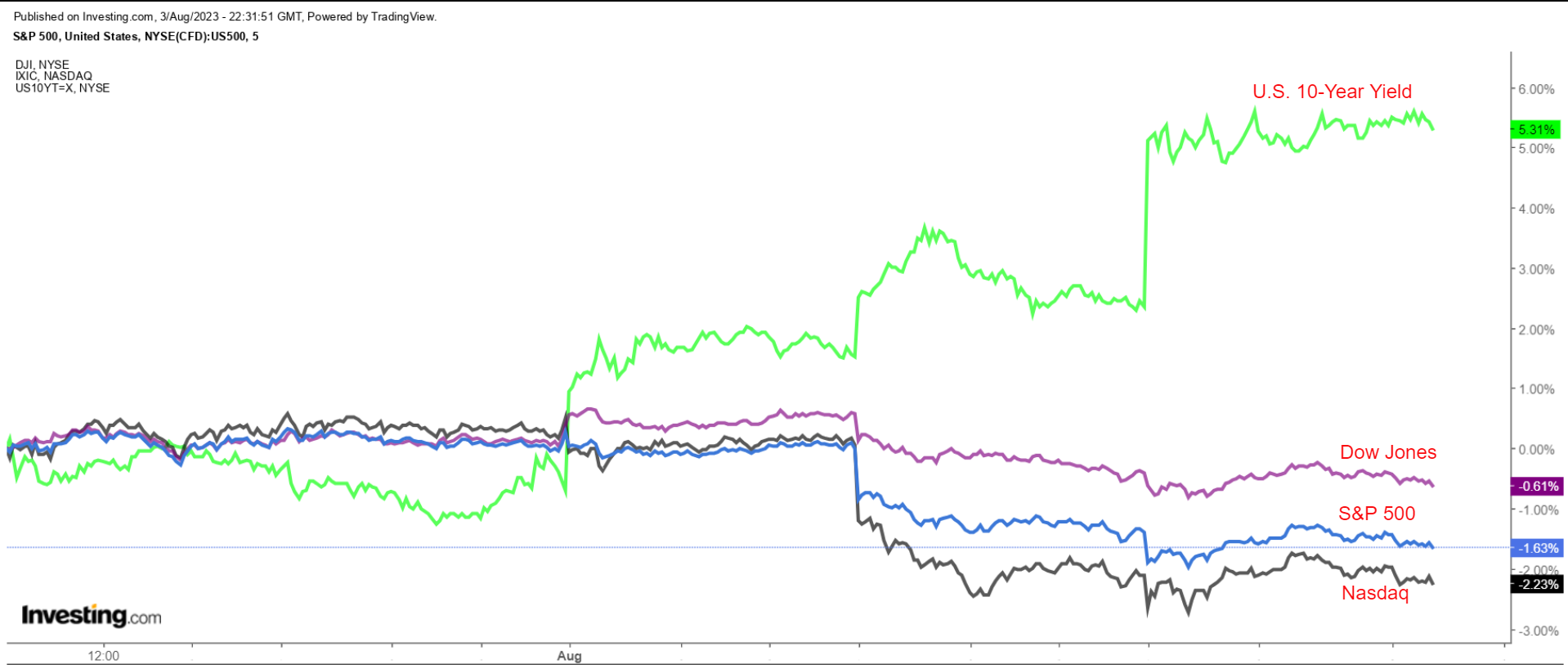 United States 10-Year yields hit a new nine-month high of 4.198% on Thursday, while 30-year yields also rose to a fresh nine-month peak above 4.30%.
United States 10-Year yields hit a new nine-month high of 4.198% on Thursday, while 30-year yields also rose to a fresh nine-month peak above 4.30%.
The latest upsurge in bond yields triggered a violent selloff on Wall Street, with the S&P 500 suffering its first three-day losing streak in months. The benchmark index posted its biggest daily percentage drop since April 25 on Wednesday, falling by more than 1%.
Meanwhile, the Nasdaq Composite recorded its worst one-day drop since February, as tech names that have led the market higher so far this year sold off on heavy volume.
All things considered, a higher 10-year Treasury yield tends to weigh on equity valuations, particularly for growth stocks, as it threatens to erode the value of their longer-term cash flows.
U.S. CPI Data Next Week
The release of the upcoming U.S. consumer price inflation report on Thursday, August 10, could mean heightened uncertainty and volatility continuing throughout next week.
The consensus estimate is that the data will show headline annual CPI cooling to 2.8% in July from the 3.0% increase seen in June.
The headline annual inflation rate peaked at a 40-year high of 9.1% last summer and has been on a steady downtrend since, however, prices are still rising at a pace well above the Fed’s 2% target.
Meanwhile, estimates for the year-on-year core figure - which does not include food and energy prices - call for a 4.7% increase, compared to June’s 4.8% reading.
As of Thursday evening, odds of another quarter-point rate hike at the next Federal Reserve meeting on September 20 eased to 17% from 22% a week ago.
Odds of the next Fed hike coming by the following meeting in November dipped to 30% from around 35%.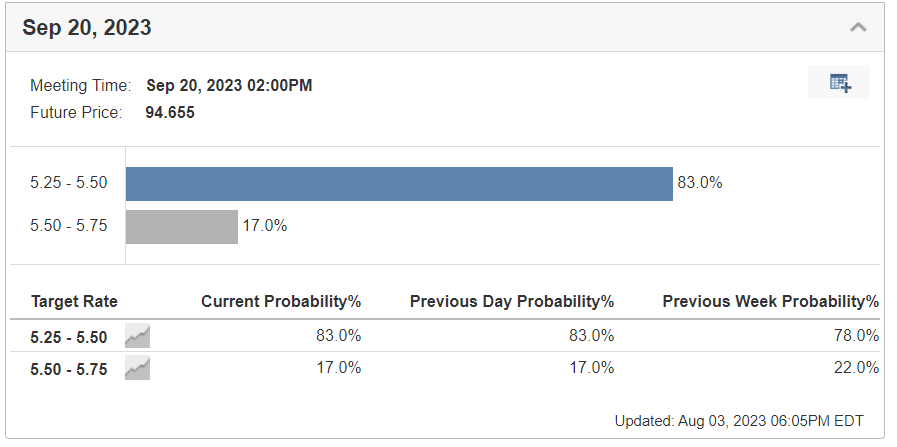
Source: Investing.com
Given the downward trend in inflation, the market is betting the Fed has reached the end of its current rate hiking cycle, which began in March 2022, even as the U.S. central bank keeps the door open to another rate increase by the end of the year.
Bulls Vs. Bears Sentiment
Meanwhile, keep an eye on investor sentiment. Excessive bullishness can hint at a growing absence of fresh new buyers to help push stocks higher and is often used as a contrarian indicator.
Indeed, two of the most followed sentiment indicators show signs that the market remains at frothy levels.
The CNN Fear and Greed Index, a sentiment gauge that combines seven different indicators to distinguish what “emotion” is driving the market, has flashed a ‘Greed’ signal for over a month, with sentiment even reaching ‘Extreme Greed' levels in the sessions leading up to the Fitch downgrade.
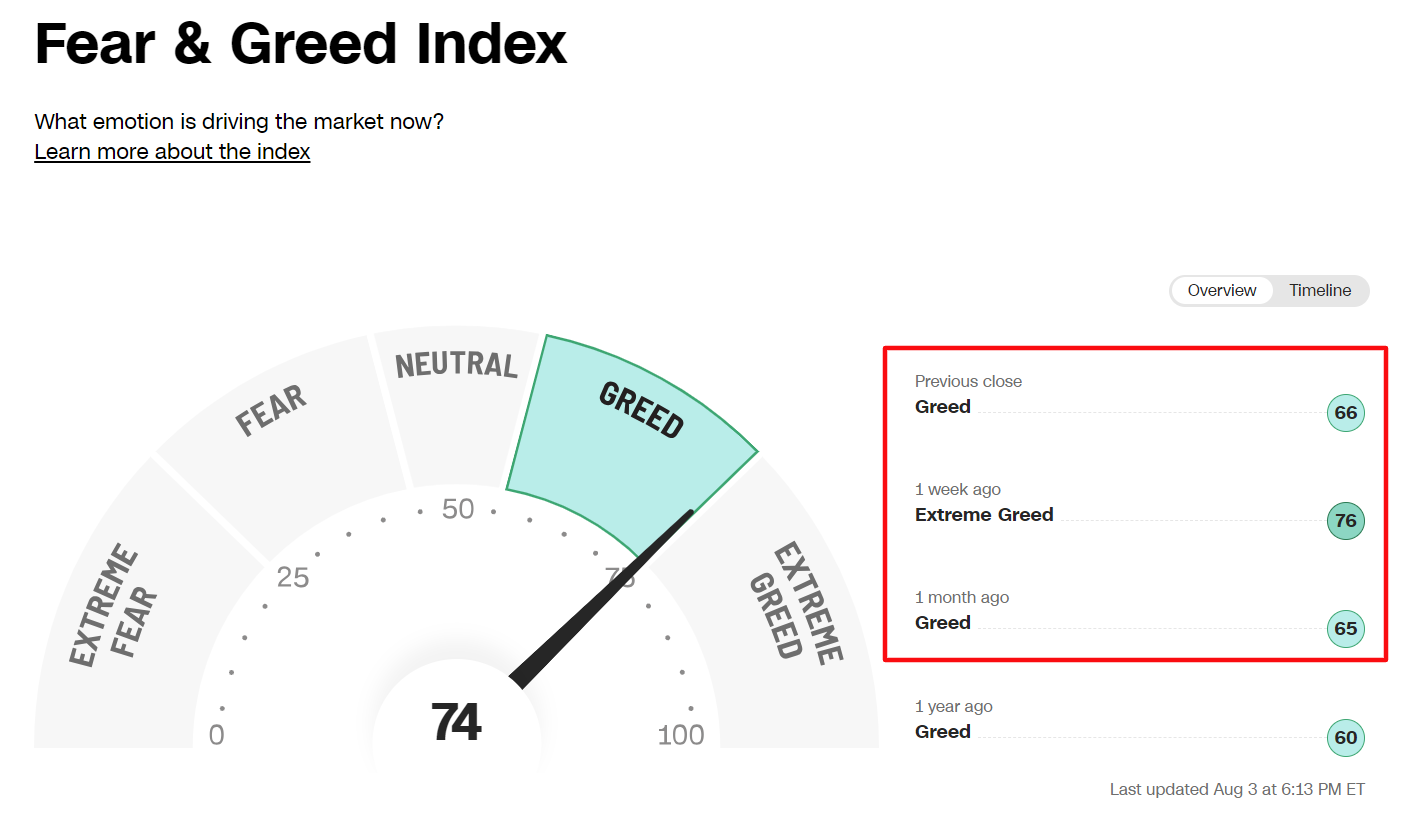 Source: CNN
Source: CNN
Meanwhile, individual investors remain increasingly bullish about the stock market, according to the latest American Association of Individual Investors (AAII) Sentiment Survey, which is another closely followed sentiment gauge.
According to the latest survey, 49% of American individual investors expect that stock prices will rise over the next six months, marking the ninth consecutive week that bullish sentiment is above its historical average of 37.5%.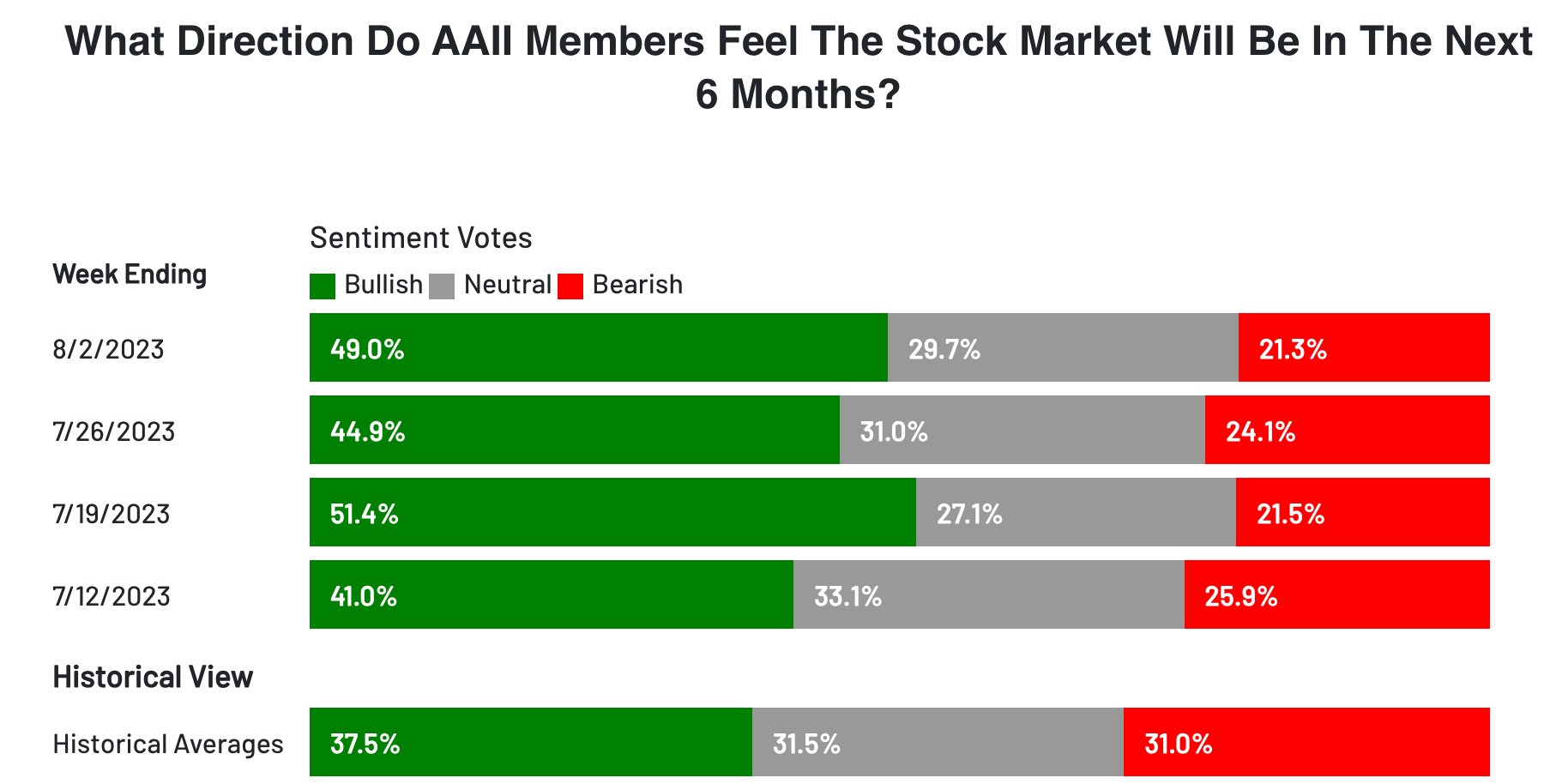 Source: AAII
Source: AAII
Only 21.3% of individual investors expressed a bearish outlook, marking the first time it has been below 30% for nine straight weeks since July 2021.
Furthermore, the AAII survey revealed that the bull/bear spread indicates that upside positioning is unusually crowded, and downside protection is attractively priced.
What to Do Now
Once again, it’s no secret that we are entering a seasonally weak period of the year for the stock market. Therefore, a pullback in August would not be surprising in my view, and I have been cautious about making new purchases amid the current environment.
It also makes a lot of sense to consider taking some profits from your biggest winners, especially if recent gains are in danger of turning into losses.
The price action over the past few sessions has suggested that investors are rotating out of high-growth tech stocks and piling into more defensive areas of the market.
Consumer defensive stocks continue to hold up well, including some discount stores, home improvement retailers, and household & personal products companies. Healthcare stocks and various commodities-related names are also doing well amid the current backdrop.
If the market rally regains momentum, an array of leading stocks will offer fresh buying opportunities. Either way, it may take some time for many leading stocks to set up again.
Best Stocks to Buy to Weather August Turmoil
Taking that into consideration, I used the InvestingPro stock screener to search for high-quality companies with solid fundamentals, robust cash flows, and a proven track record of consistent dividend payments.
That way, investors can position themselves to successfully navigate through these uncertain times while potentially benefiting from long-term growth and dividend stability, regardless of economic conditions.
So, what are the best stocks to buy now or put on a watchlist amid the current environment? I first scanned for companies whose InvestingPro ‘Profit’ and ‘Cash Flow’ benchmarks were graded as either ‘A’ or ‘B.’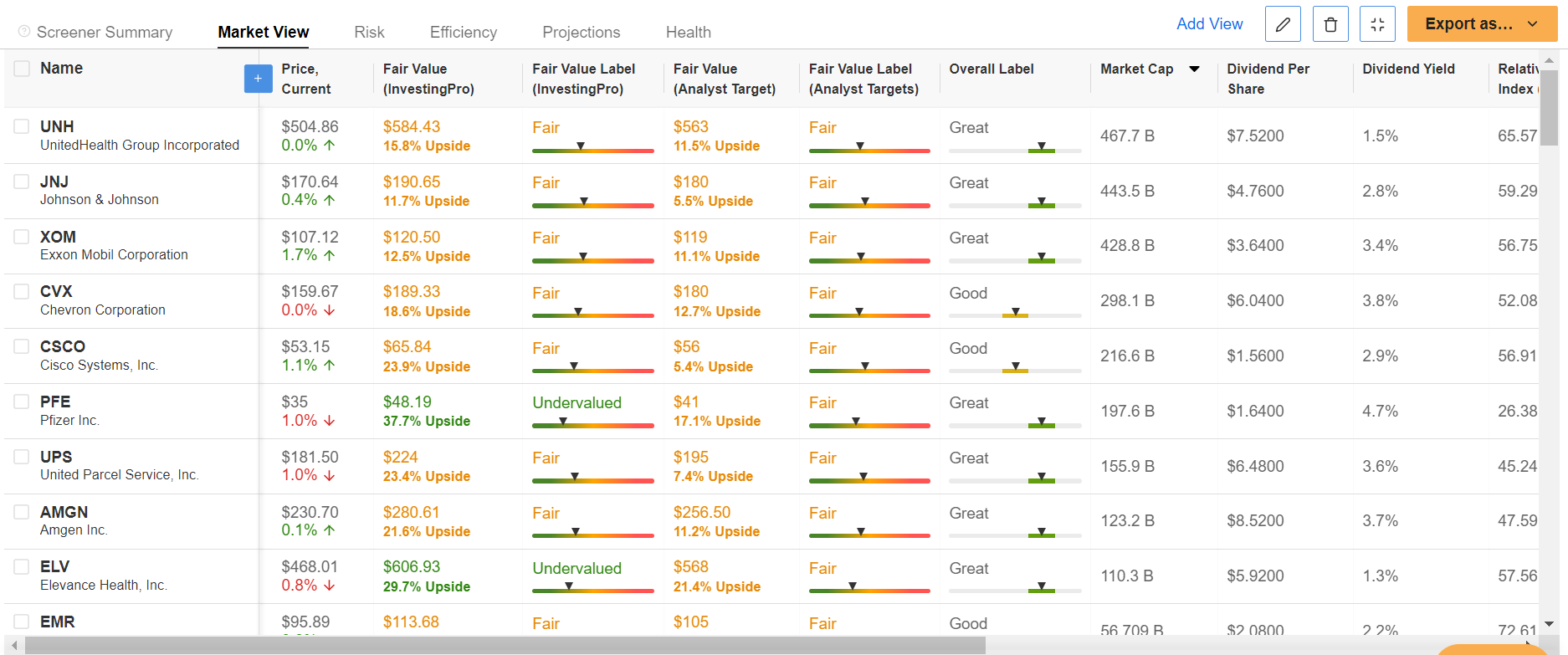 Source: InvestingPro
Source: InvestingPro
I then narrowed that down to stocks with dividend growth streaks of at least ten years. And those names with InvestingPro ‘Fair Value’ upside greater than or equal to 10% made my watchlist.
Once the criteria were applied, I was left with a total of 26 companies that all offer strong fundamentals and the potential for long-term growth amid the current market environment.
Among those names, here are the top 20 S&P 500 stocks that could shape the investing landscape in the months ahead, based on the InvestingPro models.
***
As part of the InvestingPro Summer Sale, you can now enjoy incredible discounts on our subscription plans for a limited time:
Don't miss out on this limited-time opportunity to access cutting-edge tools, real-time market analysis, and expert insights. Join InvestingPro today and unlock your investing potential. Hurry, Summer Sale won't last forever!
Disclosure: I regularly rebalance my portfolio of individual stocks and ETFs based on ongoing risk assessment of both the macroeconomic environment and companies' financials. At the time of writing, I am long on the Dow Jones Industrial Average via the SPDR Dow ETF (DIA). I also have a long position on the Energy Select Sector SPDR ETF (NYSE:XLE) and the Health Care Select Sector SPDR ETF (NYSE:XLV). Additionally, I have a position in the ProShares UltraShort 20+ Year Treasury ETF (NYSE:TBT). The views discussed in this article are solely the opinion of the author and should not be taken as investment advice.

